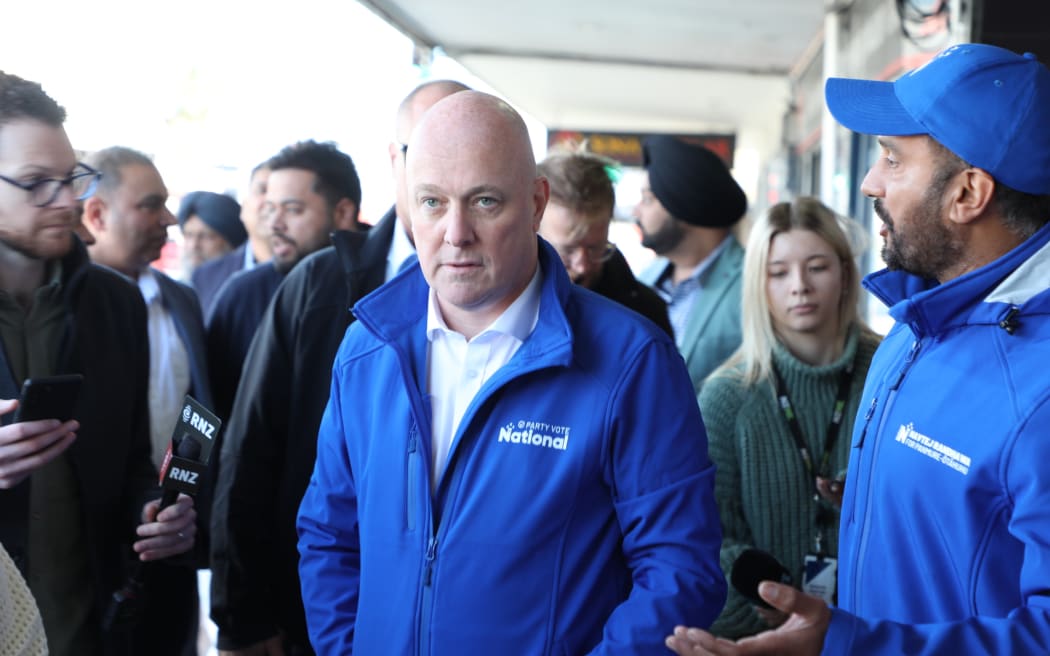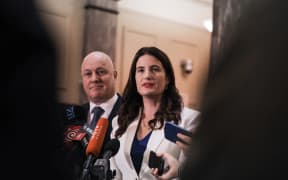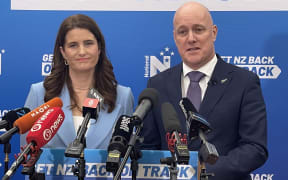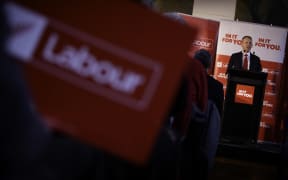
National Party leader Christopher Luxon on the campaign trail in Papatoetoe, Auckland, on Wednesday. Photo: RNZ / Nick Monro
Economists analysing National's foreign buyers tax have found it would likely raise $210 million a year - falling well short of the $740m a year National expects to rake in.
The policy would end the ban on non-residents being able to buy houses in New Zealand - but only if they paid $2m or more and paid a fee of 15 percent of the sale to the government.
The party has repeatedly refused to release the underlying assumptions and modelling behind its tax plan, despite being challenged on the large sums it expected to generate.
Those sums would also be the single largest source of revenue paying for the party's income band adjustments and other spending in its tax plan.
National's policy document stated it expected the policy to raise $715m in the first year it was introduced, increasing to about $764m in 2027/28, averaging out to about $740m a year.
Economists Sam Warburton and Michael Reddell - who lean left and right respectively - decided to do their own analysis using data from Stats NZ, real estate data from Corelogic, and the information National has so far publicly revealed about its policy.
Their independent modelling resulted in a "best estimate" of $210m a year in revenue, leaving a gap of $530m or 71 percent between their data and National's proposal. A more generous "higher-end estimate" calculated at $290m in revenue - still falling $450m, or 61 percent, short.
National's numbers 'aren't credible'
Reddell - a fiscal conservative who has heavily criticised the Labour government and the current Reserve Bank in the past - was sceptical.
"The numbers aren't credible," he said.

Michael Reddell Photo: Supplied
"We look around all the other experts who've come out with views, not a single one has produced numbers that are even close to the number that they've produced. They haven't produced the modelling - and it's not clear why.
"I've looked at revenue estimates from Toronto and Vancouver: both had 15 percent foreign buyer taxes, Toronto's bigger than New Zealand, the budget estimate last year was that would raise $175m and that's a tax that applies at all price bands."
He said this analysis made him doubt National's economic credibility.
"It goes at the margin to people's sense of 'are these people as capable potential economic managers, and managers of our government, as they'd like us to believe?"
Reddell said their modelling did not even account for the extra expense of the tax reducing demand: "If anything, I think our estimates are probably an upper bound on what National is likely to raise," he said.
Warburton said it was "not in any way plausible" for National's proposed tax to raise $740m.
"In order to close that shortfall, we would have to see foreign buyers paying $2m for $1m houses - that is houses that they would otherwise be looking at paying $1m for, paying more than double that - and then paying the tax on top of that.
"It's just not conceivable."
He said the method National appeared to have used for its calculations was, overall, sound - but the results were implausible.
"The problem is when you use the real-world data in combination with the method to generate results - and that is where the result, the estimates, do not stack up. Their estimates are just far too high".
He said their own modelling - like National's - accounted for foreign buyers tending to prioritise places where prices were high, and had forecast rising house prices over time in line with Reserve Bank expectations. They also removed Australian and Singaporean buyers - who are already exempt from the foreign buyer ban - from the calculation. They then estimated the level of international demand from before Labour announced the buyers' ban.
"The last step is behavioural change and what National means by that is 'imagine you're a foreign buyer and you're looking at buying a $1.5m house - you might be prepared to pay an extra $500,000 in order to be able to buy that house at $2m and meet National's policy ... we surveyed other economists on that ... so $550,000 all up to secure that house, but anything below that is just strictly incredible."
He said that last point was the most likely point of difference between their two models, but given the party was refusing to show its working it was hard to tell how National came up with its numbers, or how accurate they might be.
CoreLogic's head of research Nick Goodall said the firm had supplied the "essentially raw property-level value data" for the analysis.
"I find it hard to propose a situation in New Zealand where that many sales would occur above $2m to foreign buyers, to raise that tax," he said.
"That's the key problem here, is if we don't expect them to get generate the revenue they want or they have proposed, then what does that mean for the broader tax payment National are proposing in terms of tax cuts and other revenue they are expecting to generate."
He said that with National's assumptions still unreleased, they had needed to make some assumptions of their own - and probably the key mystery was National's expectation about foreign buyers' behaviour with the tax brought in, compared to now.
The economists released a paper detailing their modelling, assumptions and results. They said the data used was commercially sensitive, but they intended to fully release the modelling with scrambled data at a later time so people could test the calculations.
'I'm absolutely rock solid ... I'm really confident' - Christopher Luxon
National's leader Christopher Luxon has come under increasing pressure over the tax plan, over his party's refusal to release its own assumptions and modelling.
TVNZ's Sunday politics show Q+A host Jack Tame asked if the public deserved to see the figures.
"I'm extremely confident with our modelling," Luxon said. "We've already released what we're going to release."

Christopher Luxon campaigning in Petone on Monday. Photo: RNZ / Samuel Rillstone
Questioned by reporters in Auckland on Wednesday, Luxon remained confident.
"I'm really confident that we know what we're doing," he said.
"Because I'm absolutely rock solid that we know what we're doing, and we can deliver this.
"We have given out a 32-page report, we have released our reviewer's report and we have released also legal advice. And we have seen a range of experts and advisors that have commented and I appreciate there's a range of opinion but we are absolutely rock solid on believing we can do this."
None of those documents amount to solid evidence, calculations or data to back up the costings, however - and asked to produce those figures, Luxon again would not: "We've given you what you need to see."
Asked why voters should simply trust National over economists, he said there was "a range of opinion out there, but we have taken our advice and we are very confident in our plan".
In response to questions about the economists' findings, the party's finance spokesperson Nicola Willis put out a statement saying it was "hardly surprising to have different economists disagreeing about things".
"National is confident in our figures. They have been independently assessed by Castalia economic advisors. Our figures are conservative and assume that sales captured by the tax will be significantly less than half the number of sales to foreigners before the ban came into place. We are committed to implementing tax relief that will deliver up to $250 a fortnight for an average income family with young children."
Castalia defends its review
National's numbers were reviewed by independent strategic consulting firm Castalia, but Warburton suggested the firm's findings were not thorough.
"Castalia's review amounts to no more than two half sentences on the foreign buyers ban ... it contains no demonstration that National's estimates are correct. They may have been convinced by the information that was in the policy document because it vaguely outlines a reasonable method.
"However, when you combine that method with real world data, you cannot get the numbers that National get."
Castalia said only the executive summary of its review had been released, but the full review included analysis of the impact of replacing of the foreign buyer ban with a 15 percent tax.
They rejected the economists' analysis.
"The specific critique in relation to the foreign buyer tax appears based on a view that New Zealand residential real estate has permanently lost its position as a destination for investment capital. As far as we can see, the critique assumes that the removal of the ban will lead to a negligible number of investment transactions," the firm said.
"In our view, this requires a belief that foreign buyers have been deterred from the New Zealand market by factors other than the ban. Castalia agrees with National's assessment that return to previous trends is more likely to be accurate."
"National's modelling is based on the experience New Zealand had before the ban. We reviewed this modelling with reference to foreign buyer taxes in other jurisdictions, including Ontario, British Columbia, and Hong Kong. Our review included modelling of the reduction in purchases due to the imposition of the new tax. Hence, we believe the forecast number of sales to foreign buyers in National's tax plan is reasonable and supports the overall revenue forecast in the plan."
It is unclear how Castalia's statements match up with the approach the economists took, however, as rather than assuming a "negligible number" of sales they tested the level of sales volumes using property data, and also used pre-ban sales data as a baseline.
"We have not addressed the feasibility of this. We have just looked at, assuming that it's feasible, these are the numbers that you could expect," Warburton said.
'If they're rock-solid, show us'
Warburton disagreed with the claim there were a "range of opinions".
"There are a range of opinions on whether this was legally feasible - I have yet to see anyone strongly say that the results are plausible.
"They've been talking about doing a line-by-line review to find savings, right? ... they should be just as interested in line-by-line fiscal holes in their estimates.
"And I think this potentially opens up questions about whether the other revenue streams are credible. The issue there is that those ones are even much harder to get into than foreign buyers' tax numbers."
Reddell questioned why the party would withhold its modelling.
"If the numbers are robust, you think you'd put it out there, get a day's attention, and the issue would move on to other stuff ... if they're rock solid, show us.
"You know, when you're in government you have things like the Official Information Act that force you to release costings ... now, no one can force them to - but if they don't, then voters and independent analysts will reach their own conclusions."
Reddell noted that the shortfall in National's plan was only 0.1 percent of GDP - a fraction of the 2.7 percent gap identified in the pre-election economic and fiscal update (PREFU) released on Tuesday.
"It's a dent in the credibility, more than it's an economic dent. You know - it's embarrassing, I would have thought, for them not to have a fully funded package."








